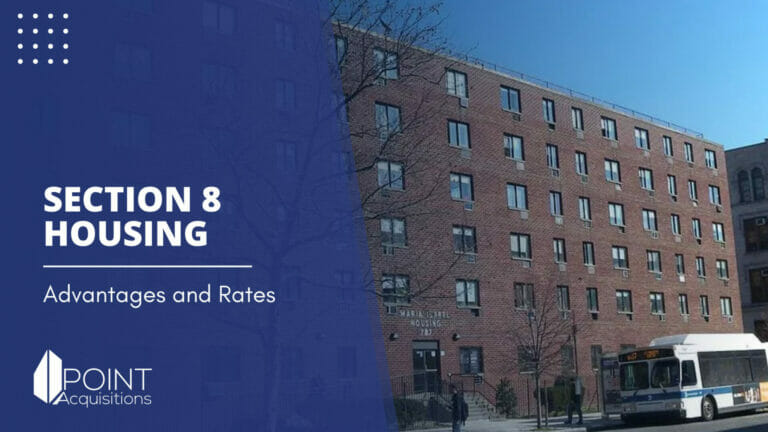
The Costs and Benefits of Investing in Section 8 Housing
Section 8 Housing is the common term for the Housing Choice Voucher Program, one of the three primary rental assistance programs facilitated by the United States government. While not every American individual or family unit experiencing financial difficulty or who is stricken by poverty is eligible, over 2,000,000 United States citizens qualify for the Section 8 Housing Choice Voucher Program. Let’s peer into the costs and benefits of Section 8 Housing from a landlord’s or real estate investor’s viewpoint.
Table of Contents
Benefits of Section 8 Housing
Unlike “regular” tenants, rent is guaranteed throughout lease term.
Typically, landlords must deal with collecting potentially late rent, or only portions of past due balances. However, one major benefit of investing in the Housing Choice Voucher Program is its guaranteed rent. While the entirety of rent payments aren’t always covered by the United States government, between 70% – 100% of monthly balances are always collected by landlords.
Lease terms are longer, providing financial stability
Those owning homes, multiplexes, and apartments that rent them out as rental properties aren’t always able to command favorable lease terms. For example, they might be forced to negotiate into 6-month leases, if not shorter. On average, leases last at least one calendar year. Fortunately for investors and landlords, many people signing leases through this ever-helpful program stay in houses they’ve already rented before for multiple lease renewals.
Downsides associated with the Housing Choice Voucher Program
Higher probabilities of wear and tear
Under Section 8 Housing, lessees generally don’t feel as responsible for damages as private, standard tenants. Lessees’ monthly rents are typically only 30% of their household income, if not entirely free. Even worse, recouping money for repairs and replacements is often impossible.
Inspections can add up
Like most government programs, Section 8 requires landlords to commission the thorough inspection of their land and properties prior to granting them access to government-assisted tenants. This is often exorbitantly expensive, reducing profit earned from Section 8 Housing endeavors.
Managing risk with Section 8
Don’t slack on screening
While the government thoroughly screens tenants, this doesn’t mean you should refrain from doing so. Vet those who apply with a fine-toothed comb, reducing the likelihood of renting to problematic tenants.
Engage in regular inspections
It’s also important to check in on tenants at least monthly, keeping them on their toes about their rentals’ condition. Simply making brief walkthroughs at randomized, unannounced times and dates will prevent tenants from acting as recklessly as others that effectively formed the Section-8-related stereotype that they’re all problematic lessees.
Final words
Even though many landlords opt to rent exclusively to private tenants, rather than through government housing programs, doing so helps needy American families get the housing they so desperately deserve. Landlords without a decade-plus of experience, if not even longer, in renting through the Housing Choice Voucher Program need luck on their side to benefit from these properties. However, investors and property owners alike almost always increase their potential benefits, hedge against risks, and ultimately generate more return after consulting qualified real estate experts for their valuable opinions.
About The Author

Jesse Shemesh
Disclaimer
Please note that Point Acquisitions is not a tax expert or tax advisor. The information on our blogs and pages is for general informational purposes only and should not be relied upon as legal, tax, or accounting advice. Any information provided does not constitute professional advice or create an attorney-client or any other professional relationship. We recommend that you consult with your tax advisor or seek professional advice before making any decisions based on the information provided on our blogs and pages. Point Acquisitions is not responsible for any actions taken based on the information provided on our blogs and pages.
1031 Exchange Capital Gains Tax Deferral
According to a 2021 report by the National Real Estate Exchange Services (RES), over 240,000 1031 exchange transactions were completed in the United States, totaling $100 billion. This impressive figure underscores the role of 1031 exchanges in the real estate…
Read More1031 Exchange Benefits
As of Q4 2023, the national vacancy rate for all commercial property types in the United States sat at 9.2%, according to CBRE’s latest insights and research. This represents a slight decrease compared to the previous quarter and suggests a…
Read MoreUnderstanding Commercial Property Value
The art of commercial real estate valuation is a critical skill in an industry teeming with over $1 trillion in yearly transactions. Our detailed guide on how to value commercial property is designed to elevate your expertise and give you…
Read More

